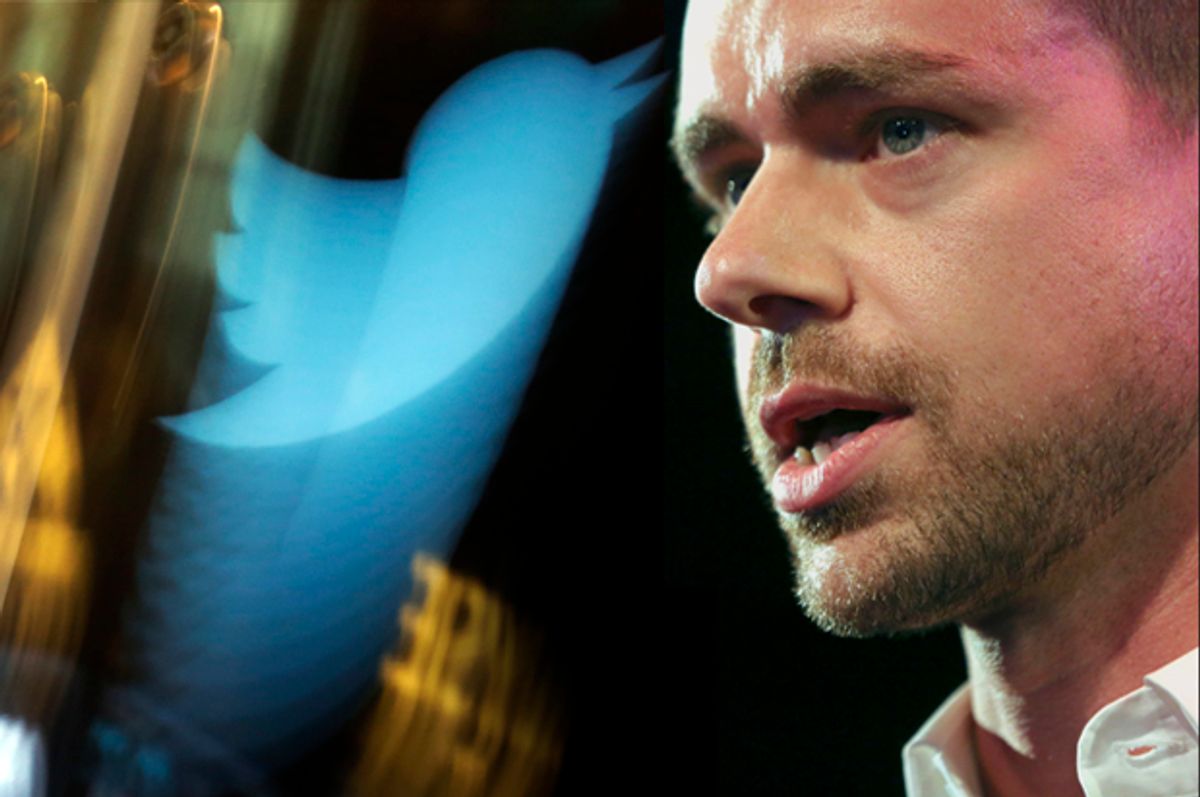Even before he was president, Donald Trump’s tweets often raised eyebrows for their content, veracity, and tendency to whip up hate and anger against his perceived enemies. In 2015, Trump took to Twitter to gleefully harass an 18-year-old girl who asked him a critical question at a campaign stop, resulting in others piling death threats on her; more recently, President Trump baselessly tweeted that Obama had tapped his phone prior to the election, an outright false claim that many of his devotees still believe.
Were he any other user, Trump’s behavior on Twitter would probably constitute grounds for a ban. Yet many have marveled over Twitter’s treatment of the president, which seems to embody the site's double standard. Embattled Twitter CEO Jack Dorsey, in a recent interview on NBC’s Sunday Today show, was asked by interviewer Willie Geist how he feels about Twitter’s role in giving Trump’s politics an elevated platform.
“I’m sure you hear from the same people I see on Twitter, who are maybe progressives or Democrats who don’t like Donald Trump, and they say, ‘how can you give this man a platform to say all the things he’s been saying’. . . how do you respond to them?” Geist asked.
“I believe it’s really important to hear directly from our leadership,” Dorsey explained, “and I believe it’s really important to hold them accountable. And I believe it’s really important to have these conversations out in the open, rather than have them behind closed doors.”
“If we were all to suddenly take these platforms away, where does it go?” Dorsey continued. “What happens? It all goes in the dark. And I just don’t think that’s good for anyone.”
Of course, Twitter frequently takes away its platforms from all kinds of users, leaving them “in the dark” and deleting all record of their virtual existence. Supposedly, Twitter is entitled to suspend users for hate speech and bullying, yet its record proves that its moderation system is nonsensical. The social media company has given “verified” status — the blue checkmark you see next to some users’ names, asserting them as important public figures — to figures like Richard Spencer, the white nationalist whose entire public persona is built on a brand of fomenting racist ideologies. (Note: Twitter very briefly suspended Spencer’s account once, before reinstating it; likely, Spencer’s outsize public presence — he sat for interviews in which he decried Twitter’s moderation policies as “Stalinist” — helped his case.)
If the point of Twitter moderation is to prevent trolling and harassment, isn’t this undermined by giving a seal of approval to white nationalists like Spencer who have built their entire careers on asserting the inferiority of other races?
And if Twitter exists to have public “conversations out in the open, rather than behind closed doors,” as Dorsey claimed, why is the company so quick to suspend important voices on the left — like Brace Belden, the American fighting with Kurdish left-wing militant group YPG to defeat ISIS in Syria, and whose life story is soon to be the subject of a film from actor Jake Gyllenhaal and director Daniel Espinosa?
Perhaps the philosophy of Twitter moderation could be summed up as follows: those with an outsize voice and following have a free rein to harass; their attention is good for the platform and drives clicks. Those who are small potatoes or who express more radical politics — especially on the left side of things — seem ripe for a ban. It took Twitter far too long to ban professional troll and long-time Breitbart commentator Milo Yiannopoulos, who made a career on harassing those to his left; indeed, only after spearheading a campaign of racist harassment against actress and comedian Leslie Jones was Yiannopoulos finally banned.
“Twitter seems to honestly not care about the garbage that gets thrown around at its community members, every moment of its existence,” wrote Mary Elizabeth Williams of the incident targeting Jones. “If Twitter can’t step in and effectively handle what happens to Leslie Jones, how well do you think it addresses what happens to ordinary people trying to have conversations about what’s going on all around us right now?”
I suppose this is the darkest, most cynical point to be made about Facebook, Twitter, and all the other social media sites: they profit whenever you are harassed. The more you tweet in your defense, the more attacks you instigate, the more bile spewed — this is all great for their bottom line. It drives engagement — the dystopian turn of phrase for how long you look at or interact with their site. And it goes without saying that the longer you stare at Twitter or Facebook, the more ads you see, and the more they profit. Eyeballs drive profit, even if they're full of tears. Trump’s harassment, falsehoods, and all the other despotic nonsense he posts are great for Twitter’s bottom line.



Shares